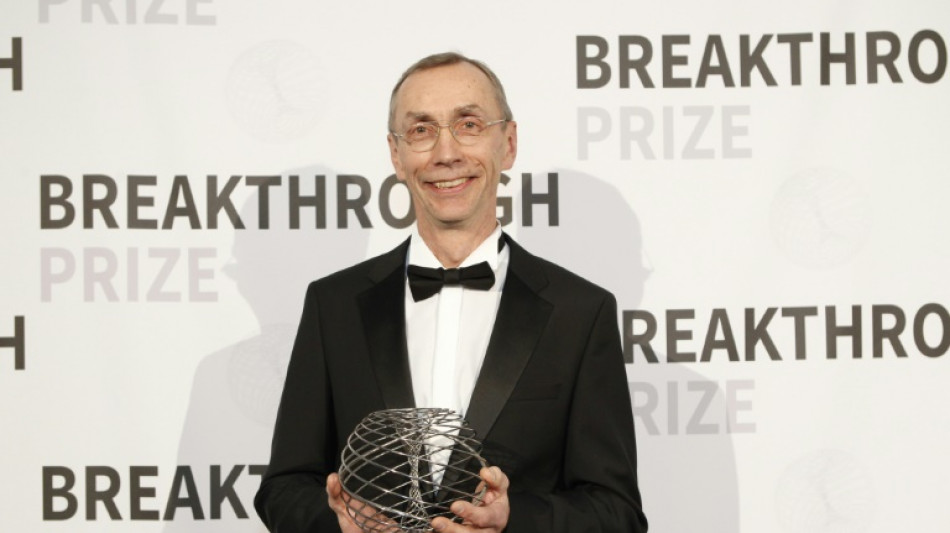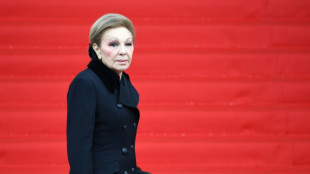
-
 Trump says world 'not secure' until US has Greenland
Trump says world 'not secure' until US has Greenland
-
Gold hits peak, stocks sink on new Trump tariff threat

-
 Champions League crunch time as pressure piles on Europe's elite
Champions League crunch time as pressure piles on Europe's elite
-
Harry arrives at London court for latest battle against UK newspaper

-
 Swiatek survives scare to make Australian Open second round
Swiatek survives scare to make Australian Open second round
-
Over 400 Indonesians 'released' by Cambodian scam networks: ambassador

-
 Japan PM calls snap election on Feb 8 to seek stronger mandate
Japan PM calls snap election on Feb 8 to seek stronger mandate
-
Europe readying steps against Trump tariff 'blackmail' on Greenland: Berlin

-
 What is the EU's anti-coercion 'bazooka' it could use against US?
What is the EU's anti-coercion 'bazooka' it could use against US?
-
Infantino condemns Senegal for 'unacceptable scenes' in AFCON final

-
 Gold, silver hit peaks and stocks sink on new US-EU trade fears
Gold, silver hit peaks and stocks sink on new US-EU trade fears
-
Trailblazer Eala exits Australian Open after 'overwhelming' scenes

-
 Warhorse Wawrinka stays alive at farewell Australian Open
Warhorse Wawrinka stays alive at farewell Australian Open
-
Bangladesh face deadline over refusal to play World Cup matches in India

-
 High-speed train collision in Spain kills 39, injures dozens
High-speed train collision in Spain kills 39, injures dozens
-
Gold, silver hit peaks and stocks struggle on new US-EU trade fears

-
 Auger-Aliassime retires in Melbourne heat with cramp
Auger-Aliassime retires in Melbourne heat with cramp
-
Melbourne home hope De Minaur 'not just making up the numbers'

-
 Risking death, Indians mess with the bull at annual festival
Risking death, Indians mess with the bull at annual festival
-
Ghana's mentally ill trapped between prayer and care

-
 UK, France mull social media bans for youth as debate rages
UK, France mull social media bans for youth as debate rages
-
Japan PM to call snap election seeking stronger mandate

-
 Switzerland's Ruegg sprints to second Tour Down Under title
Switzerland's Ruegg sprints to second Tour Down Under title
-
China's Buddha artisans carve out a living from dying trade

-
 Stroking egos key for Arbeloa as Real Madrid host Monaco
Stroking egos key for Arbeloa as Real Madrid host Monaco
-
'I never felt like a world-class coach', says Jurgen Klopp

-
 Ruthless Anisimova races into Australian Open round two
Ruthless Anisimova races into Australian Open round two
-
Australia rest Cummins, Hazlewood, Maxwell for Pakistan T20 series

-
 South Korea, Italy agree to deepen AI, defence cooperation
South Korea, Italy agree to deepen AI, defence cooperation
-
Vietnam begins Communist Party congress to pick leaders

-
 China's 2025 economic growth among slowest in decades
China's 2025 economic growth among slowest in decades
-
Gauff, Medvedev through in Australia as Djokovic begins record Slam quest

-
 Who said what at 2025 Africa Cup of Nations
Who said what at 2025 Africa Cup of Nations
-
Grizzlies win in London as heckler interrupts US anthem

-
 Three-time finalist Medvedev grinds into Australian Open round two
Three-time finalist Medvedev grinds into Australian Open round two
-
Auger-Aliassime retires from Melbourne first round with cramp

-
 Rams fend off Bears comeback as Patriots advance in NFL playoffs
Rams fend off Bears comeback as Patriots advance in NFL playoffs
-
Thousands march in US to back Iranian anti-government protesters

-
 Gotterup charges to Sony Open victory in Hawaii
Gotterup charges to Sony Open victory in Hawaii
-
Gold, silver hit records and stocks fall as Trump fans trade fears

-
 Auger-Aliassime retires injured from Melbourne first round
Auger-Aliassime retires injured from Melbourne first round
-
Gauff through, Auger-Aliassime retires as Djokovic begins record quest

-
 China says economy grew 5% last year, among slowest in decades
China says economy grew 5% last year, among slowest in decades
-
Young star Zheng may have to give back Australian Open prize money

-
 Gauff overcomes wobble in winning start to Melbourne title bid
Gauff overcomes wobble in winning start to Melbourne title bid
-
Harry set for final courtroom battle against UK media

-
 'It wasn't clean': Mother mourns son killed in US Maduro assault
'It wasn't clean': Mother mourns son killed in US Maduro assault
-
Louvre heist probe: What we know

-
 Surging billionaire wealth a political threat, Oxfam warns as Davos opens
Surging billionaire wealth a political threat, Oxfam warns as Davos opens
-
Morocco fans stunned, disappointed as Senegal win Africa title


Svante Paabo, Swedish medicine Nobel-winner follows in father's footsteps
Swedish paleogeneticist Svante Paabo, who won the Nobel Medicine Prize on Monday for using DNA to reveal the link between humans and Neanderthals, drew early inspiration from his Nobel laureate father.
However Paabo later learned that his father had been living a "double life", and his existence had been kept a secret from his father's other family.
Paabo, 67, was awarded the medicine Nobel for a long list of achievements including sequencing the Neanderthal genome for the first time and discovering the existence of a distant human relative called the Denisovans.
He was born in Stockholm in 1955 to Estonian chemist Karin Paabo and Sune Bergstrom, a biochemist who won the Nobel Medicine Prize in 1982. His father died in 2004.
In his 2014 memoir "Neanderthal Man: In Search of Lost Genomes", Paabo wrote that he gained inspiration to study medicine at Sweden's Uppsala University from his father, who had previously been a medical doctor.
Later he learned that his father "had two families, one of which did not know about the other," he wrote.
"I had grown up as the secret extra-marital son of Sune Bergstrom," Paabo wrote, adding that he had "only occasionally" seen his father as an adult.
Paabo also followed in his father's footsteps by studying biochemistry, earning a PhD at Uppsala University for using DNA research to study a protein of adenovirus, common viruses which cause cold-like symptoms.
But Paabo had long been fascinated with mummies and "could not quite shake off my romantic fascination with ancient Egypt," he wrote in his memoir.
- An impossible task -
The crossover of his medical research using DNA and preoccupation with mummies put him on the path that would become his life's work.
"Could it be possible to study ancient DNA sequences and thereby clarify how ancient Egyptians were related to one another and to people today?" he asked in his book.
"Such questions were breathtaking. Surely they must have already occurred to someone else."
Finding that they had not, Paabo sought his own answers.
It proved a difficult task, because there are only trace amounts of DNA left in ancients remains.
He first made international news in 1985, when he published research that found a DNA fragment in the mummy of a 2,400-year-old child.
Paabo then turned his focus toward Neanderthals when he was recruited by Germany's Munich University in 1995.
A year later, he managed to sequence some mitochondrial DNA from a 40,000-year-old piece of Neanderthal bone.
He then became the head of the genetics department at the Max Planck Institute for Evolutionary Anthropology in Leipzig, Germany.
He accomplished the "seemingly impossible task" of publishing the first Neanderthal genome sequence in 2010, according to a statement from the Nobel Assembly.
The research surprised by the scientific world by showing that Neanderthal genomes are still present in one to four percent of humans from European or Asian descent.
"We find traces of their DNA everywhere," Paabo told AFP in 2018.
- 'Normal human beings' -
Also in 2010, Paabo and his team revealed the existence of Denisovans, an extinct human relative, just by sequencing the DNA from a 40,000-year-old finger bone.
Only a year before these breakthroughs were published, Paabo developed potentially life-threatening blood clots in his lungs.
While researching his illness, "to my amazement I stumbled upon references to my father's work in 1943", Paabo wrote in his memoir.
His father had "elucidated the chemical structure of herapain," the drug "which had perhaps saved my life," he wrote.
In an interview published by the Nobels on Monday, he said that having a Nobel-winning parent may have also given him confidence by showing that "such people are normal human beings and it's not such an amazing thing".
"You don't put your parents on a pedestal," he added.
He now identifies as bisexual and has two children with primatologist Linda Vigilant, who also works at the Max Planck Institute.
H.Seidel--BTB


